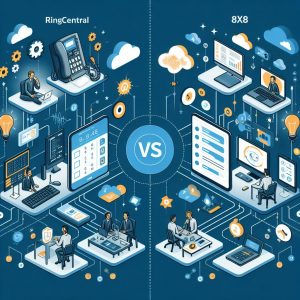Introduction
As remote and hybrid work explodes, cloud business phone systems offer flexible solutions to unify communication and collaboration. RingCentral and 8×8 are leading options with robust features at affordable pricing. This head-to-head guide compares their plans, capabilities, ease of use, support and integrations to help select the best fit.

Pricing & Plans
Both providers structure tiers by user count, billed monthly or yearly with discounts:
RingCentral
RingCentral’s three core plans scale from basic calling to advanced unified comms needs:
MVP ($29.99/month per user)
Provides call management fundamentals like auto-receptionist, call forwarding and visual voicemail. Unlimited US/Canada calling bundles in too.
Advanced ($34.99/month per user)
Rings in video meetings, single sign-on, and shared lines for small team unity. Integrates with business apps like Office 365 and G-Suite.
Ultra ($49.99/month per user)
Top-tier collaboration abilities via executive desktop softphones, call analytics and AI-powered tools emerge at this tier. Salesforce integration also unlocks.
8×8
8×8 similarly offers three tiers by capabilities and price:
X2 ($25/month per user)
Includes unlimited international calling in 47 countries to seed global growth ambitions affordably from launch.
X4 ($45/month per user)
Four-way video meetings, 50+ integrations with apps like NetSuite and Hubspot, single sign-on and advanced analytics unlock here.
XC ($65/month per user)
The premium offering piles on executive desktop phones, salesforce integration and other enterprise features for maximizing ROI long-term.

General Features
Fundamental communication abilities align across both providers:
Video Conferencing
Host large online video meetings with screen sharing. Record sessions, create breakout rooms and leverage waiting rooms.
Unified Messaging
Never miss customer calls. Intelligently route them across devices, access voicemails in inboxes, enable call flip and forward calls remotely via desktop/mobile.
Mobility & Status
Stay connected and updated on colleagues’ availability via mobile apps. Place and receive business calls via smartphone softphones using the business identity.
When evaluating secondary aspects like software capability, hardware ecosystems and third-party integrations, distinguishing strengths emerge.
RingCentral Shines In:
Next-gen Team Messaging
Flag messages for follow-up, assign tasks, like and comment on posts across devices to contextualize conversations.
Open API Architecture
Leads unified comms interoperability, with 200+ app integrations spanning CRMs, cloud storage services and productivity suites.
Premium Video
Produce broadcast-grade townhalls and webinars using RingCentral Video Pro to simulate multi-camera studios with director controls and interactive elements.
8×8 Wins in:
Global Scale
Leverage numbers and data centers in over 50 countries for international team unity. Local dial-in numbers ease global conferencing access too.
Bundled Minutes
Get unlimited calling inclusive of 47 countries to centralize global communication costs. Allocate cross-border minutes as needed too.
Conversation Intelligence
Gain actionable insights from conversations via real-time sentiment analysis, talk track adherence monitoring and contextual search capabilities.
Ease of Use
While both systems take training, 8×8 gets the edge for intuitive navigation:
RingCentral
The extensive configurability that enables precise customization for specialized needs comes at the cost of a steeper learning curve. Mastering advanced functionalities across the desktop and mobile apps takes time.
8×8
The thoughtfully organized admin console centralizes access to common settings for fast unified communication provisioning. The uncluttered and responsive web interface speeds mastery for admins and employees.
Customer Service
Expect attentive support with both big names. Unique assistance flavors cater to different preferences:
Administrative Managed Services
Alleviate IT burdens by outsourcing day-to-day management like adding/removing users, configuring phones and resolving issues to the provider’s dedicated success managers.
On-demand Specialists
Book remote sessions with product experts to handle must-finish tasks like complex software installations for new regional offices in a timely manner.
Global Infrastructure
8×8’s worldwide datacenters and support centers spanning North America, Europe, Asia Pacific and Australia enable quick access to nearby technical teams for accelerated issue resolution.
Diagnostic Tools
RingCentral provides self-help resources like network assessment tests, system status dashboards and 24/7 online ticketing for convenient troubleshooting without waiting on hold.
Integrations
Both sync with popular business apps but niche strengths emerge for specific platforms:
RingCentral
Leads native integration breadth and depth for industry’s most popular CRM, trackers and cloud tools including Salesforce, Zendesk, Okta, and Box.
8×8
Shines for out-of-the-box integration with suites like Microsoft Dynamics, Oracle NetSuite and corporate SSO environments enabling consolidated navigation.
API Extensibility
Developers prefer RingCentral’s unrivaled access to underlying telephony infrastructure via extensive REST APIs compared to 8×8’s more limited developer options.
Embedded Experiences
Users wanting deep UC functionality without changing workflows will appreciate contextually embedding 8×8 video, voice and messaging across web apps.

Conclusion
In closing, growing enterprises wanting market-leading futureproof video meetings, mobility and BYOD support will see RingCentral as the superior choice today. However, cost-conscious companies aiming to enable distributed global workforces quickly with reasonably robust features can’t go wrong with 8×8 either. Determine must-have capabilities for current and future team scenarios before procuring demos tailored to your environment and scalability aims. Prioritizing critical pain points over nice-to-have features will realizing maximum value faster from your selected vendor.